If you are planning to expand your online presence to new and foreign markets, you must include target market-oriented SEO in your marketing efforts. The first and probably the most critical step will be to do international keyword research to optimize your keywords for the target market.
Table of Contents
It is basic marketing knowledge that when optimizing your website or paying for clicks on ads, you will always want to target the most effective keywords.
However, once it gets to reaching an audience outside of the English speaking world, this essential and strategic process is left on the sidelines.
Companies and individuals might be tempted to translate their texts and hope to catch some keywords along the way.
While one might get lucky, this approach will more likely than not, result in keywords that underperform.
Here you will find my step-by-step guide to effective international keyword research and why every business with global ambitions should pay attention to the keywords in their field.
Go to top
Simple Keyword Translation Has Its Limitations
Your company has been growing successfully in your market, and now you’ve decided to take your endeavours global.
You want to expand as fast as possible and might be tempted to merely translate your existing keywords, rather than putting in the time and effort into keyword research.
It is an easy and quick way to get a list for all your target markets – I get that!
However, you will have to keep in mind that this strategy might save time and money at first, but in the long run, your business will miss out on a lot of value due to poor rankings and searchability.
People who search for products or services do not search for a standard dictionary translation of English keywords.
An audience who speaks different languages often does not have the same way of relating to a product or service.
Example:
Let us assume your website targets an audience interested in projectors in the US. Your site gets significant traffic from that keyword, and now you are trying to replicate that success in Germany.
So you simply translate the word and get “Projektor”. It is a correct translation, but Germans rarely call it that way. A better and more search engine friendlier keyword would have been “Beamer”.
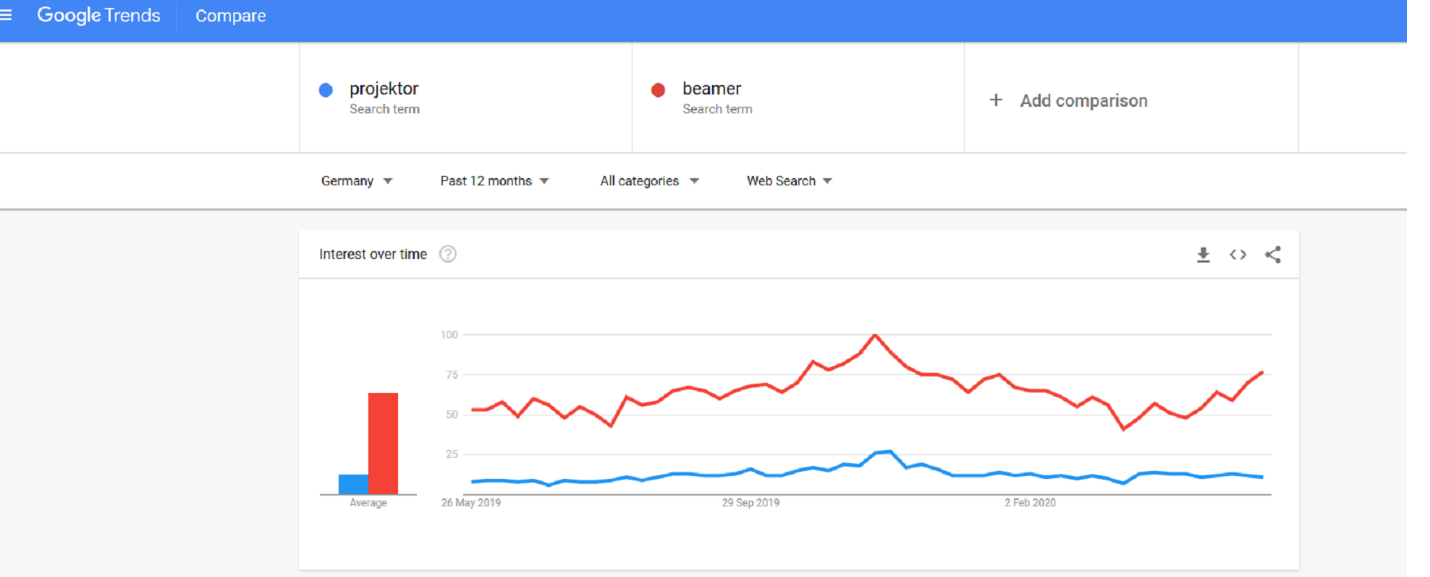
A graph from Google Trends showing the search trends of “projektor” compared to “beamer.”
Some keyword research and analysis over at Google trends would have revealed that “Beamer” has a 4+ times higher search volume than the (also correct) word “Projektor”.
Hence, switching from generic translation to a more typically used word improves your reach fourfold. – Not bad!
People search for keywords and phrases that they associate with a product or service, which can often be abbreviations, slang or currently trending.
You will only know what your target audience is searching for by actually putting in the effort researching their language.
By stringing along terms or words in a translated file, you aren’t guaranteed search volume and are purely gambling on the fact that your translation will end up being searchable.
Also, keep in mind that for the majority of websites, only a small fraction of their keywords are responsible for the majority of traffic. So, really optimizing and digging deep can be a make or break point for your international expansion.
Remember: A search engine such as Google can only help you so far, but you will need to assist it and ensure that you are feeding it with the right keywords.

Ensure That You’re Feeding Google The Correct Keywords
Focus On Your Target Audience
Now that you know that directly translating your texts is a big no-no and international keyword research is crucial to really seizing opportunities in the global market, you’ve got to start digging.
Each country and language has differences in their search patterns and search terms.
A successful multilingual SEO strategy will hence require in-depth research into the target audiences’ behaviour and style of language. Here language, culture and the search engine will have a significant impact on user intent and search patterns.
Understand Language:
Language structure will determine how searchers phrase their queries into the search engine.
For example, in the German language, you will often use compound nouns which can lead to some terrifyingly long looking words. This can have quite a significant impact on your German keyword research because Google still doesn’t fully support compound nouns.
What you get is that plenty of German users search for split phrases even though grammatically incorrect.
Example: Toy shop translated correctly is “Spielzeugladen”, but users will often prefer to look up “Spielzeug Laden” just because it will show better results.
When doing international keyword research, it therefore becomes crucial to compare search volume between the exact translation and one that is split, carries slang or even a common spelling error.
Although it is not good practice to add tons of incorrect words into your copy just so that you might garner more traffic, it can sometimes be a good idea to target both versions in a paid search campaign for example.
This being said, you are strongly advised to check your copy with a native expert. Should you fail to do so, you risk that your keywords might be target terms that are entirely unrelated to your product or service.
Learn How to Localize a Website Successfully
How To Build A Multilingual Website? Here Are The First Steps [Complete Guide]
Understand Culture:
Every international SEO campaign has to reflect local search preferences.
A greater understanding of culture can help communicate more efficiently with your target audience. And that is precisely what keyword research is all about – you want to communicate in a way that reflects your potential customer’s preferences.
In East Asian countries, for example, users often prioritize verbs, while in the West, people commonly use nouns for their searches.
Learn About Targeting Local Consumers With Web Content
In some areas of the world, a shape can be more of a focus point than material.
With this in mind, it becomes obvious why you will need your website to be highly optimized by a professional and cannot rely on just a translated keyword list.
Getting back to the German language example. Six countries have German as their official language.
Most words can simply be translated from English to German and will be correct in all six countries. However, that doesn’t mean that they are the most commonly used forms.
Hence, you will need to know how people speak in everyday life and find out the perfect equivalent that targets the right audience.
The Search Engine:
When it comes to search engines, Google has by far the most significant market share and controls close to 90% of the entire market.
While optimizing for Google is always a good idea for most countries, there are regions in which local engines dominate.
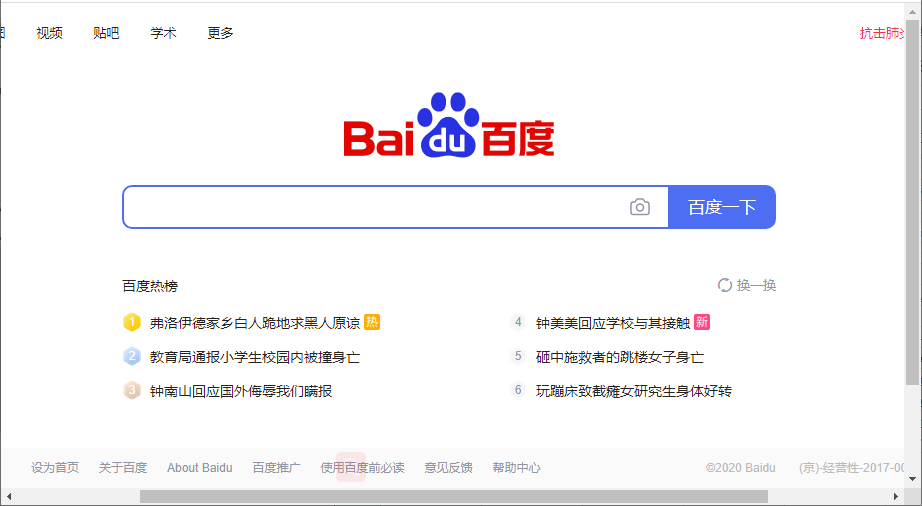
When conducting international keyword research don’t forget that large percentages of users use search engines other than Google. In China Baidu dominates search.
Baidu, for example, processes web searches for 70% of the Chinese market and Google searches are completely off-limits.
Hence a one-size-fits-all approach to multilingual keyword research isn’t going to cut it.
As a result, depending on the country, you will have to do your research on the corresponding platforms to optimize your SEO strategy.
Keyword tools, like Google Keyword Planner, Baidu Keyword Planner or Wordstat, will assist you in finding the most dominant keywords for your niche.
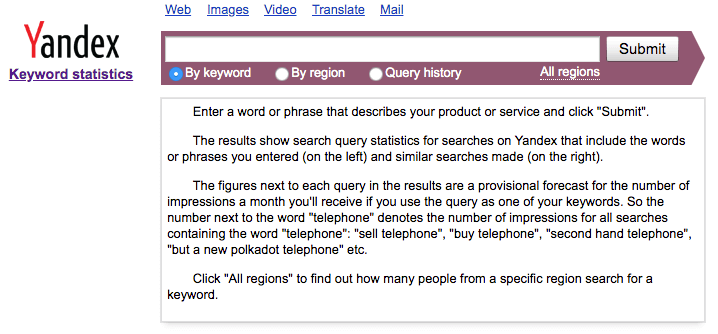
Find Dominant KeyWords Using Tools Like Wordsat By Yandex.
How To Do International Keyword Research
Now that you know why multilingual keyword research is imperative for success in foreign markets, I will outline how you can go on about searching for the most effective keywords, especially for Latin based languages.
But first, I will need to set one thing straight – excellent implemented keyword research will require resources and expertise that only a professional native translator can deliver.
That is because even if you happen to be decent in a language, it doesn’t mean a direct translation will work (for the reasons stated above).
Always use professional linguists in the language pair who also understand the practice of keyword research. A proper understanding of culture, language, and SEO gives them the ability to find the perfect localized equivalent for your keywords.
However, if you do speak the language well and want to know how to get the most out of your translation, these tips and tricks will help you out.
1) Start creating a list of keywords
I am going to assume that for your English site, you have done your keyword research and developed your content based on a list of important keywords.
If you don’t have that list or if you want to know for which keywords your site ranks best, use one of the many keyword research tools available. Ubersuggest, Ahrefs, SEMrush, and MOZ’s are all very powerful tools that you should definitely look into.
These tools let you input your URL and tell you which keywords your page has been optimized for and for from which keywords you get the most traffic. – Use these metrics to compose a comprehensive list of keywords
2) Start translating
Translate your keyword list into the target language. While translating, create a separate list with words that you believe are related, could reach the same audience and might be relevant for SEO.
3) Analyze
Use a tool like Ubersuggest, setting the region on your target market, and analyze your keywords. Essential factors to consider here are search volume and ranking difficulty (SEO difficulty). Try focusing on words with high search volume and low keyword difficulty.
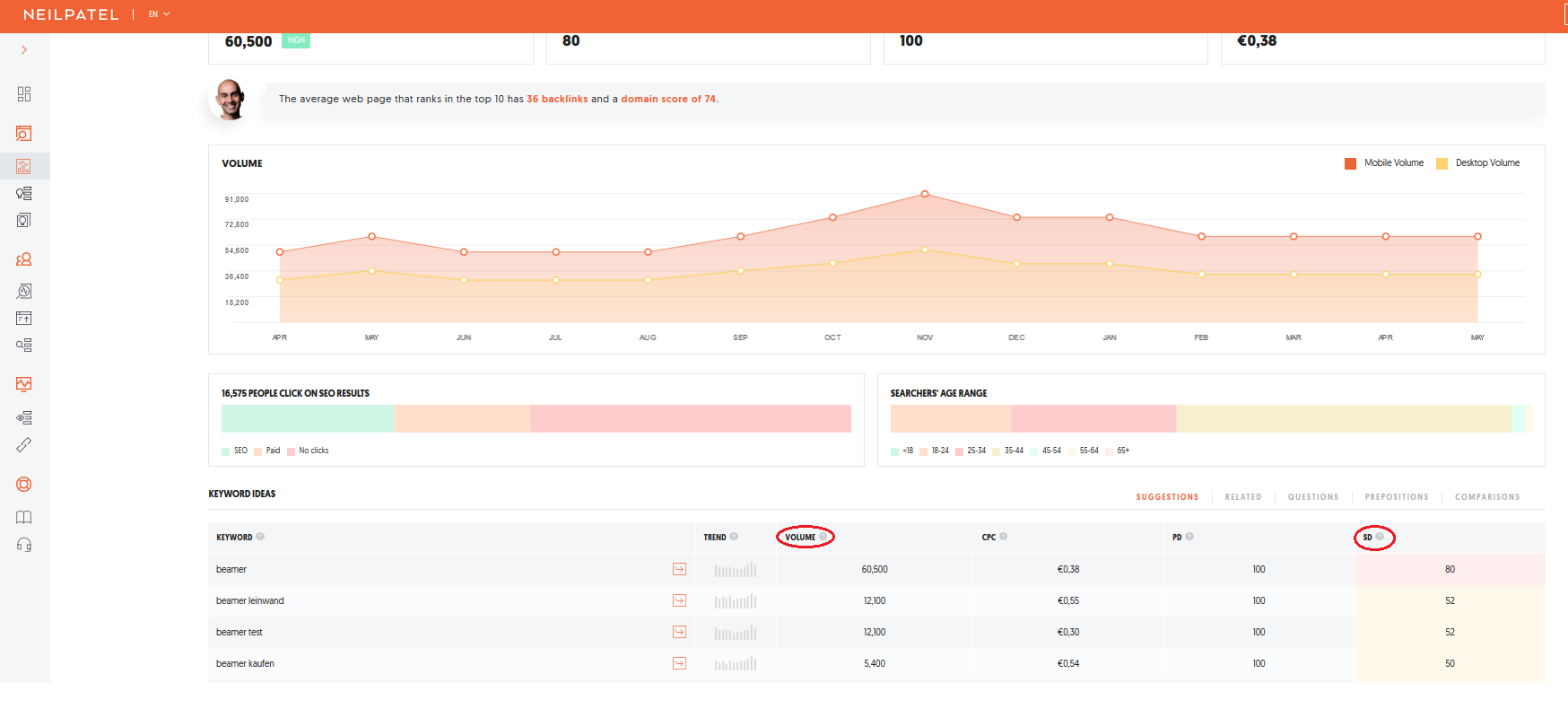
Ubersuggest is a great tool for researching keywords in different languages for SEO.
There can be many keywords in your industry that result in plenty of site traffic but do not convert into sales.
This typically occurs when keywords funnel a lot of traffic to your site from an overly broad audience that might not necessarily be interested in your product or service.
To avoid putting in tons of time and effort into your SEO without maximizing conversion, you should strategically select the right mix of broad and longtail keywords.
4) What is your competition doing
Great, you’ve now created your own keyword list, and its time to figure out how and from where some of your successful competitors are generating their traffic.
Once you have identified your local competitors, you can utilize a tool like SEMrush’s Domain vs Domain tool to extract keywords that they are ranking for, but you are not.
But before you go ahead and just copy all of them, you should again do your own analysis and identify the ones with high search volume and low SEO difficulty.
Here is a short guide on how to use this powerful tool–a great way to find proven keywords in foreign markets!
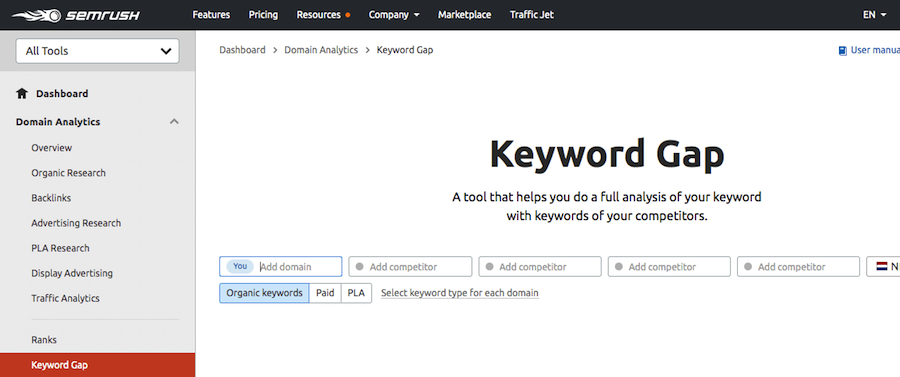
Extract Extra Keywords Your Competitors Are Ranking For Using “SEMrush’s Domain vs Domain” Tool
5) Organize
To make the translation and writing process a lot easier, it can be a good idea to create a spreadsheet and map keywords from your list to the equivalent English pages on your site.
The next step is increasing your global visibility on search engines such as Google. I am talking about content optimization here, which entails including your localized keywords into your copy.
Remember that it is good SEO practice to include the main keyword(s) once in the Title, Meta Description, URL and a few times, in the rest of your copy.
An important note: Google has become a lot smarter at analyzing and ranking sites.
Keyword stuffing used to be an easy way to rise through the ranks, but over the years and plenty of algorithm updates, it no longer works.
Metrics such as time spent on site and site engagement are now some of the critical factors that determine how well you rank.
Therefore you should always try to prioritize proper spelling and grammar and write naturally. This will keep your viewers engaged way more than hard to read, overly keyword-stuffed content.
Here is where great translators and copywriters deliver value.
A translation should seamlessly introduce the keywords from your list into the copy. A translated website should never sound unnatural to your readers or spammy to search engines.
6) Keep an eye on your keyword success:
Once your translated and localized site is live, you should begin to monitor the performance of your keywords.
Online marketplaces and keywords can go through trends and may change relatively quickly.
Keywords that no longer are raking in the amount of traffic they used to should be reviewed, analyzed and replaced if there are better alternatives out there.
Once you have started targeting keywords in your target languages and you are getting an idea of what works for you, start including your top keywords into international backlink building efforts. Find authoritative and related websites that people use in your target market and get those websites to link back to you in contexts related to your keywords.
Conclusion:
Simple keyword translations won’t cut the chase in the highly competitive online world and will never achieve the result you are striving for.
To succeed with a multilingual website, you will need to put in as much emphasis on SEO as you did for your English page.
Remember, pure translations of your keywords will likely cost you more in the long run.
Performing international keyword research may take more time, but it will put you in a strong competitive position, gaining valuable clicks and higher conversion rates.
It goes without saying that only a native speaker who fully understands the market, language and culture of your targeted region will be able to carry out a successful international SEO strategy.
Multilingual keyword optimization can be one of your most essential tools in your global expansion endeavor.
Want a Quote?
Request a quote for your localization project today!
Tell Me About Localization Services
David Beckett is a German to English Translator and started his own translation company in Vancouver, Canada. Over the past few years, he has been able to acquire comprehensive experience in the e-commerce space, social media marketing and financial space. He now runs a blog on his website talking about social media and languages in addition to his freelance translation career and e-commerce business.



